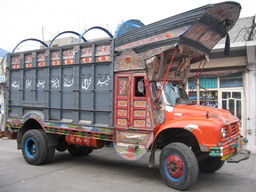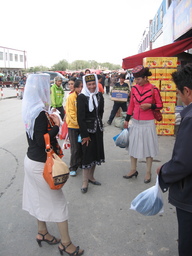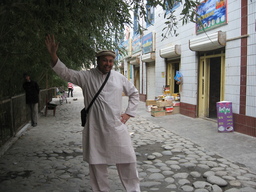
Pakistani Truck
 Pakistani Truck |
I've come back up the Karakorum Highway into China. Leaving Pakistan, the first stop in China is Tashkorgan, a city which is remote even by the standards of Xinjiang. Tashkorgan lies far closer to the borders with Pakistan, Afghanistan, and Tajikistan than to the nearest city within China: Kashgar.
The local population has never seen large numbers of ethnic Chinese. For the past several centuries the majority of people here have been Tajik: speakers of Persian. Since my arrival yesterday I've seen lots of other interesting faces around the streets, including larger numbers of Uighurs and Kyrgyz than I had expected to see. As with all of the land on China's fringe--Xinjiang, Tibet, Inner Mongolia--it's only today ethnic Chinese, or Han, are becoming the majority. I get the sense that development here today must be similar to the way pioneers in the United States expanded that country in the 19th century. Families seeking more opportunity head west, setting up simple businesses. The government builds up a basic infrastructure: roads, schools, communication lines; people migrate, gradually the balance tips. Many of the people I've met here are from poorer provinces of China where there is little opportunity--Sichuan, Henan: they're just average people looking for a better life.
The end result will inevitably be the same as what happened with the native population in North America. The language, dress, and culture from back east is already beginning to dominate. Within a few generations the local traditions will no longer be alive. Already, Tashkorgan's small city center is made up mostly of Chinese-owned establishments.
Given the rapid rate of change, in some ways I am suprised by what visible traditions do remain. There is no written version of the Tajik language used here, as opposed to the Cyrillic just across the border in Tajikistan. Nor is there Tajik-medium schooling. Most local Tajiks are educated in Chinese, though a small minority--about 5%--opt for Uighur-language schools. Despite this, even today Tajik continues to be spoken widely on the streets of Tashkorgan--at least by the people who were born here.
 Tajik Women |
Getting to Tashkorgan from Lahore was a long trip up the Karakorum Highway. I was tempted to fly from Lahore to Gilgit, or even from Islamabad through to Kashgar. However, the waiting list on the LHE => GIL flight would have meant another week in Lahore. Being cheap as I am, I decided against the flight into Kashgar. Going by road has cost well under $50 USD and offered a spectacular journey through the mountains.
My birthday wound up being spent mostly on the road, starting in Mansehra, ending in Gilgit. The distance is just a few hundred kilometers, but the terrain makes for slow-going, winding around hills and rivers. It took our bus over 15 hours to go the distance. On that bus ride I was seated in the back, surrounded by ten students who were making the trip by land from Karachi, a journey of several days. I'd been eavesdropping in on the conversation for several hours. I couldn't understand everything but could tell that there was a lot of religious content. It turned out that they were all students of Islam, making a trip to visit nine different mosques around Gilgit over the next month.
I avoided overtures to chat for the majority of the trip: I didn't want to be stuck next to somebody practicing English or bending my ear for hours upon end on some topic I might be indifferent to. However, after what I knew would be the final meal stop I opened up. An eighteen-year old boy wearing a beautifully wound turban had tried to engage me in conversation earlier in the day, I invited him to sit next to me in the seat somebody had just vacated. I wound up chatting with the whole lot of them--nine Pakistanis, one Afghan--for a couple hours. They were friendly and talkative, but the topic seldom strayed from religion.
After reaching Gilgit I spoiled myself by staying in a suite at the Park Hotel, which has long been one of Gilgit's nicer hotels. I spent a couple days around town: relaxing, shopping, dining. Gilgit is a small mountain town in Pakistan's north so "shopping and dining" doesn't carry the connotation it might in Paris. That said, I did make a point to pick up several of the Chitrali caps which most local men wear and have one last meal of dal before crossing back into lentil-less China. I knew that I should have bought sweets down in the Punjab, but did manage to locate some passable gulab jamuns.
From Gilgit it was a short minibus ride north to Karimabad in the Hunza Valley. I stayed at the same place Michael and I stayed when we passed through four years ago: the Old Hunza Inn. I'd been chatting over dinner with a couple other travelers at the table of dining hall when one of the staff looked my way. "Did you stay here three or four years ago? You were heading up to China, you're American, right?" he asked. I asked how he could remember me--Michael and I had only stayed a couple nights. "It's your voice, the way you say things," was all he said.
 Now that I'm back on the other side of the border, my language abilities
are in need of re-acclimation: I'm having a hard time getting out of
speaking Urdu and back into speaking Uighur. The Chinese seems to still be
there, coming out of my mouth as I need it. Since arriving last night
though, most of the sentences I attempt to speak in Uighur come out as
Urdu. I've been trying to figure why my Chinese is there but not my
Uighur. I'm speculating that perhaps it's because--despite belonging to
completely different language families--there is a lot of overlap between
Urdu and Uighur. Both use postpositions, rather than prepositions. Urdu and
Uighur both have a huge core vocabulary of loan words which have come from
Arabic and Persian. They are both written out in modified versions of the
Arabic script.
Now that I'm back on the other side of the border, my language abilities
are in need of re-acclimation: I'm having a hard time getting out of
speaking Urdu and back into speaking Uighur. The Chinese seems to still be
there, coming out of my mouth as I need it. Since arriving last night
though, most of the sentences I attempt to speak in Uighur come out as
Urdu. I've been trying to figure why my Chinese is there but not my
Uighur. I'm speculating that perhaps it's because--despite belonging to
completely different language families--there is a lot of overlap between
Urdu and Uighur. Both use postpositions, rather than prepositions. Urdu and
Uighur both have a huge core vocabulary of loan words which have come from
Arabic and Persian. They are both written out in modified versions of the
Arabic script.
To get myself back into the element I've been keeping my portable radio tuned to the Uighur-language service, listening to the radio dramas. It's strange: I can understand the Uighur just as well as when I left Xinjiang two weeks ago. It's just when I try to speak, it all comes out Urdu.